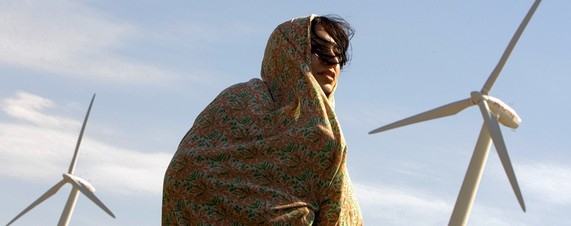Monday 17 September 2012 - 23:52
Story Code : 5816
In Iran, the wind blows free. Of sanctions, that is.
In recent months, Iran's nuclear, oil and natural-gas industries have been the subject of intensifying sanctions from the international community. Now the country wants to develop a sector in which it has more leeway: renewables.
At a recent Tehran exhibition, local companies, some of which are doing business with European companies, displayed domestically made solar panels and wind turbines. "Fossil fuels will run out, but wind will always be available and no one can put sanctions on it," says Ali Shirazi Tabar, a mechanical expert at Mapna Group one of Iran's largest power contractors.
Already, Iran has the largest installed renewable-energy capacity in the Middle East, with 9,385 megawatts, according to the green-energy information database Energici.
New U.S. and European sanctions on companies doing business with Iran's oil and natural-gas sector are part of an international effort to curb Iran's nuclear program. Iran's fossil-fuel industry is targeted because it is the country's largest source of revenue and the West suspects it could help finance Iran's nuclear program.
But a European Union spokesman confirmed that renewable energy, including wind, solar and biomass, aren't part of the European sanctions. A U.S. Treasury spokesman said such sales are banned for U.S. companies unless a specific license is granted.
Not everyone is happy about the distinction the Europeans are making. Nathan Carleton, a spokesman for New York-based United Against a Nuclear Iran, says the EU sanctions should include renewable-energy technologies, "given the international effort to isolate the regime and stop its nuclear pursuits."
Iranian officials, meanwhile, have made it clear they want to push clean energy. In May, President Mahmoud Ahmadinejad earmarked about $620 million in government funding to support such projects. The government sees renewables as a way to alleviate pollution, a common problem in congested cities such as Tehran. It also sees an opportunity for Iran to reduce its oil dependency.
Local geography will help. The Lut Desert in eastern Iran, for instance, has the hottest land surface temperature on record, at 70.7 Celsius, or 159.3 Fahrenheit, according to the U.S. National Aeronautics and Space Administration. And the Global Wind Energy Council identifies the country's mountainous west and northeast as holding unique wind corridors.
Iran's renewable-energy business potential has attracted the interest of European players. This month, German wind-turbine manufacturer Fuhrl�nder AG is delivering 12 turbines to Mapna as part of a licensing accord allowing the Iranian business to replicate the turbines, the companies say, without disclosing a value for the contract.
Iranian power contractor Ghods Niroo Engineering Co., is studying a project to turn urban waste into energy in Iranian cities of more than 250,000 inhabitants, says Fataneh Doustdar, renewables project manager at the company.
Still, green energy can face the same collateral issues as other nonsanctioned businesses in Iran, from canceled bank transactions to problems importing spare parts. Abbas Karamifar, an adviser to local wind-turbine maker Saba Niroo Co., which exports to Armenia, says the company is struggling to find certain parts not produced in Iran. For instance, foreign suppliers are reluctant to sell prepreg, a composite fiber that is indispensable for the turbines' blades but that could also be used for helicopters.
Iranian companies say their efforts in developing green technologies will ultimately benefit the rest of the planet. Iran also "wants to develop renewable energies because of global warming," says Ms. Doustdar of Ghods Niroo. "From an environmental point of view, it is for the good of the world."
The Iran Project is not responsible for the content of quoted articles.
# Tags











